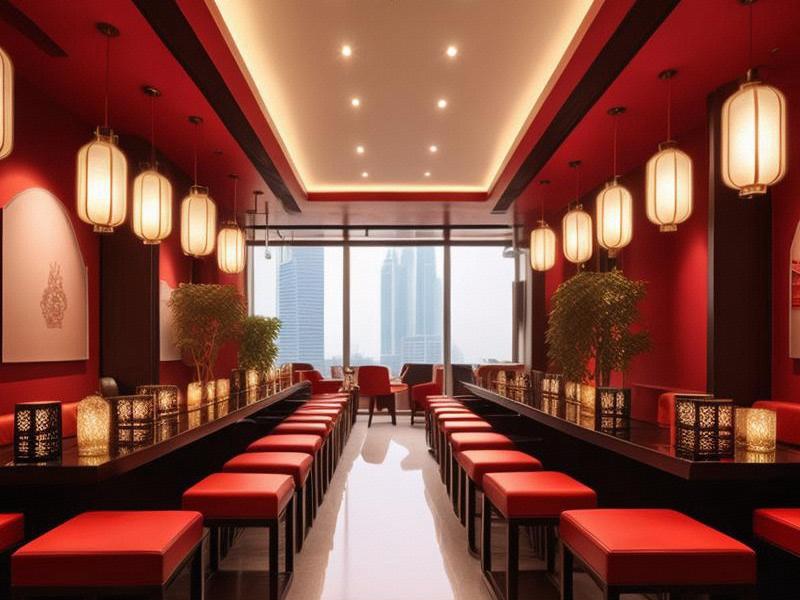
In the heart of Shanghai, a city that never sleeps, the entertainment scene is as dynamic and multifaceted as the metropolis itself. From world-class theaters and concert halls to trendy bars, nightclubs, and art galleries, Shanghai's entertainment venues offer a rich tapestry of cultural experiences that cater to a wide spectrum of interests and tastes.
The city's commitment to preserving its rich cultural heritage while embracing modernity is evident in the array of entertainment options available. Traditional Chinese opera houses coexist with cutting-edge contemporary art spaces, showcasing the perfect blend of old and new. This harmonious coexistence reflects Shanghai's unique identity as a global city that values its past while looking boldly to the future.
One of the most iconic entertainment venues in Shanghai is the Grand Theatre, a masterpiece of modern architecture that has become synonymous with the city's cultural aspirations. Designed by the renowned French architect Paul Andreu, the Grand Theatre features a striking egg-shaped design that houses three performance spaces: a 1,800-seat opera house, a 1,200-seat concert hall, and a 400-seat experimental theater. Here, audiences can enjoy world-class performances ranging from Peking opera and ballet to symphony orchestras and contemporary plays.
Another notable venue is the Shanghai Centre Theatre, located in the bustling Lujiazui financial district. This state-of-the-art facility hosts a variety of performances, including Broadway musicals, West End shows, and classical concerts. Its prime location makes it easily accessible for both locals and tourists, ensuring a steady stream of patrons eager to experience the best of live entertainment.
上海贵人论坛 For those seeking a more intimate and experimental cultural experience, the M50 Creative Park is a hidden gem. Located in the former factory buildings of the No. 50 Shengchang Textile Mill, this artsy enclave has transformed into a haven for contemporary artists and galleries. With over 100 galleries and studios, M50 offers a platform for emerging and established artists to showcase their work. Visitors can wander through the charming courtyard, admiring the colorful murals and sculptures that adorn the walls, and discover the latest trends in contemporary art.
Shanghai's nightlife scene is equally vibrant, with a plethora of bars, nightclubs, and live music venues scattered across the city. The Bund, a historic waterfront area, has become a hotspot for trendy bars and restaurants, offering stunning views of the Pudong skyline. Here, patrons can enjoy a drink while soaking in the breathtaking scenery, making it a favorite spot for both locals and tourists.
In contrast, the French Concession area is known for its laid-back and eclectic nightlife. This charming neighborhood is home to a variety of bars and clubs, ranging from jazz lounges to electronic dance music venues. The cozy atmosphere and friendly locals make it an ideal place to unwind after a long day.
Art galleries and exhibitions also play a significant role in Shanghai's entertainment scene. The Power Station of Art, a former power plant turned contemporary art museum, is one of the largest and most influential art institutions in China. It hosts a diverse range of exhibitions, featuring works by both Chinese and international artists. The museum's vast collection spans various mediums, including painting, sculpture, photography, and video art, providing visitors with a comprehensive overview of contemporary art.
上海水磨外卖工作室 Another prominent gallery is the White Space Gallery, which focuses on contemporary Chinese art. Located in the Xintiandi area, this small but influential gallery showcases the works of emerging and mid-career artists. Its minimalist design and intimate setting crteeaa perfect environment for appreciating the subtle nuances of contemporary art.
In addition to these well-known venues, Shanghai is dotted with numerous smaller, lesser-known spots that offer unique cultural experiences. For instance, the Shanghai Propaganda Poster Art Centre is a fascinating museum dedicated to the history and evolution of propaganda posters in China. Housed in a former printing factory, the museum features a vast collection of posters dating back to the early 20th century, providing insights into the political, social, and cultural changes that have shaped the country.
The Shanghai Jewish Refugees Museum, located in the Hongkou District, tells the story of the Jewish refugees who fled to Shanghai during World War II. This poignant exhibit highlights the resilience and courage of these individuals, who found safety and solace in the city despite the challenging circumstances.
上海品茶网 The success of Shanghai's entertainment venues can be attributed to the city's proactive approach to urban development and cultural preservation. The local government has invested heavily in infrastructure projects, ensuring that these venues are accessible and well-maintained. Additionally, policies promoting cultural exchange and innovation have fostered a vibrant and diverse entertainment scene.
Moreover, the increasing popularity of Shanghai as a tourist destination has further boosted the demand for high-quality entertainment options. Tourists from around the world flock to the city to experience its unique blend of traditional and modern culture, contributing to the growth and prosperity of the entertainment industry.
However, challenges remain in maintaining the balance between commercialization and cultural authenticity. As the entertainment scene continues to evolve, it is crucial to preserve the city's rich cultural heritage and ensure that the experiences offered are genuine and meaningful.
In conclusion, Shanghai's entertainment venues are a testament to the city's dynamic and multifaceted cultural scene. From world-class theaters and contemporary art spaces to vibrant nightlife and historical museums, these venues offer a wide range of experiences that cater to the diverse interests of the city's residents and visitors. As Shanghai continues to grow and develop, its entertainment scene will undoubtedly remain a cornerstone of the city's identity and a source of pride for its people.
